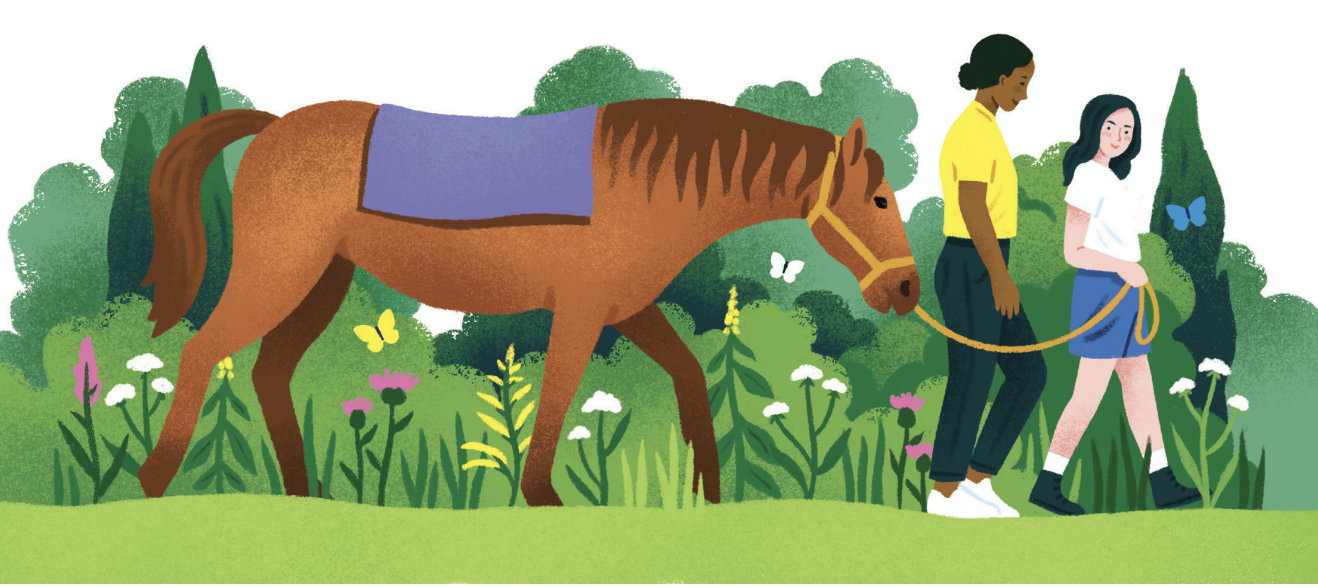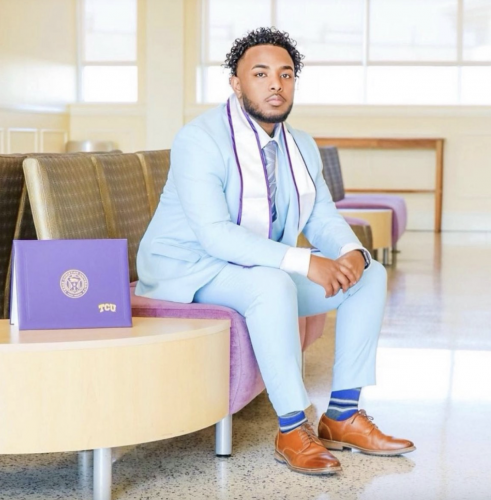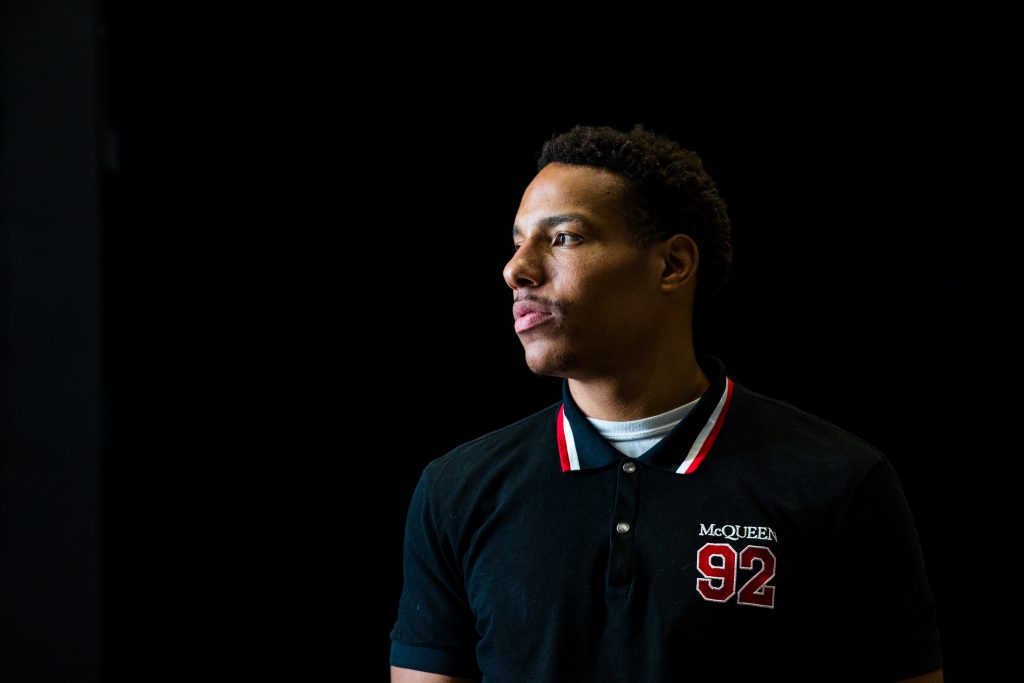
Illustration by Lucy Davey
Advocating for Youth
New major provides experience helping children in settings outside the classroom.
As a TCU undergraduate, Mohamed Ade Mohamed ’22 learned by traveling far from campus. During a human rights internship, he walked the halls of Washington, D.C., engaging in conversations with politicians including U.S. Reps. Marc Veasey and Ilhan Omar. He notified news organizations about a human rights march from New York to Washington and documented its progress on social media.
Mohamed was working as an intern for the Sindhi American Political Action Committee on behalf of people in Pakistan who face inequality in areas including politics, education and health. To illustrate: More than 1,500 children in Pakistan’s Sindh province contracted HIV because of a needle reuse scandal amid an impoverished and corrupt medical culture.
While many people feel called to work with children, not everyone wants to stand in front of a blackboard. TCU’s youth advocacy major equips students like Mohamed to work with and advocate for young people in professions that are alternatives to teaching.
“Being a youth advocate is not one thing,” Mohamed said. “It encompasses multiple things, and you get to choose what role you want to play.”

“Being a youth advocate is not one thing,” Mohamed Ade Mohamed said. “It encompasses multiple things, and you get to choose what role you want to play.” Courtesy of Mohamed Ade Mohamed.
Established in 2018, the major was the brainchild of Cynthia Savage, professor of professional practice and associate dean of teacher education, assessment and undergraduate studies in the College of Education. Outside of TCU, Savage serves as an evaluator of educational programs; that work puts her in touch with school district administrators and a broad range of nonprofit and for-profit professionals within educational organizations and initiatives.
To name a handful: Dallas and Fort Worth Independent School Districts, United Way, Arlington Child Care Council and Book Trust. Many of the professionals working at these organizations, such as program facilitators and grant developers, were serving children and young people, but not as teachers.
“I learned that people got into those spaces kind of randomly,” Savage said. “Maybe they had a degree in journalism or marketing. They [often] didn’t have backgrounds [in] education or any kind of core foundation [in] human development.” She said that since this work is focused on children, these professionals would benefit from “a basic understanding of child development and best practices.”
So she and other interested faculty created a major that, she said, supports “this other side of education … everything that happens outside the classroom walls that involves youth and, really, their families.”
Students study the local and global impacts of youth advocacy efforts across an interprofessional range of agencies, policies and disciplines. Classwork is supplemented by site visits, guest speakers and at least six credit hours of hands-on, resume-building internships. Together, the program components combine to give TCU students a glimpse of the many ways to support young people.
The program is part of a growing recognition of youth advocacy as a field in its own right, said Brandy Quinn, associate professor of education and youth advocacy program coordinator, who has helped to create and hone the major.
“In the youth development world,” she said, “there’s been an increasing … professionalization of what it means to work in out-of-school settings and what one needs to do that effectively.”
The major has attracted traditional and nontraditional students, including student-athletes, veterans and Community Scholars. Many students double-major in another field such as social work or strategic communication.
Alumni of the program have gone on to graduate work in fields including law, juvenile justice, curriculum studies, counseling, educational psychology, nursing and public policy. Others have become family engagement specialists, Fulbright Scholars, college and career advisers, youth ministry leaders, teachers and nonprofit administrators.
Some have pursued sports careers, including Memphis Grizzlies star Desmond Bane ’20, who as an intern started a camp for kids facing difficulties with coordination. Bane still works with youth via backpack drives and at summer basketball camps, Savage said. “He’s able to leverage his platform as a professional athlete to continue in this space.”
DIY Pathfinding
As a sophomore, then-education major Molly Bucknam ’19 was student-teaching when she realized traditional instruction wasn’t the right fit. After deciding to switch to youth advocacy and educational studies — a new major at the time — she came to value its flexibility and the opportunity to gain a variety of skills.
“It was a really great way that I could pivot and not like completely derail, since I was so far down the education path,” Bucknam said. “If you want to change careers, it’s so adaptable.”

Established in 2018, the major is the brainchild of Cynthia Savage, professor of professional practice and associate dean of teacher education, assessment and undergraduate studies in the College of Education. Illustration by Lucy Davey
While many students sign up for the major knowing what they want to do next, some aren’t as sure. The program supports students who are still undergoing a discernment process while ensuring a good runway once they choose.
By the time Bucknam graduated with a dual major in economics and youth advocacy and educational studies, she felt well-prepared for graduate work in global human development at Georgetown University, where she is now a master’s candidate.
The major “provided a really great foundational level of understanding,” Bucknam said. “It allowed me to have flexibility and not be pigeonholed into a career.”
This bespoke quality has been consciously stewarded, Quinn said. “One of the things that we love and want to keep about this program [is the] flexibility and openness it has for students to do something unique with it.”
The ability to shape his own education was a big part of the program’s appeal for Jack Sewell ’21. He is now the director of operations for Arise Africa, a Fort Worth-based nonprofit that works with youth in Zambia.
“If there was something that I wanted to do or was interested in studying” — such as a course in child psychiatry through the Karyn Purvis Institute of Child Development — “the administrators and the professors would help me make that happen,” Sewell said.
Hands-On Learning
As Mohamed witnessed in Washington, experiential learning is central to the youth advocacy and educational studies major. Sometimes the experience even happens on the hoof, as when students visit the Fort Worth nonprofit STEPS With Horses.
The organization provides mental health services to at-risk youth and other populations with the assistance of horses — full-size and miniature — and a donkey. TCU students spend a few hours simulating a client session, mingling with the animals and discussing their experiences.
The work is based on “the premise that the client’s interactions with the animals is a microcosm of what’s going on in their day-to-day life,” said Hallie Sheade, executive director.
During observational class visits, TCU students may practice activities involving mindfulness, try leading the animals with a halter and explore ways of communicating with the animals.
“Generally, by the end of each visit, it’s hard to get the students to leave,” Sheade said. “They connect with these animals.”
In addition to class visits to community organizations, professors challenge students to delve deeper during internships that can span two to three semesters. Students can explore positions with such entities as schools and colleges, law firms or nonprofit organizations. For equitable access, some interns are compensated via an endowment funded by the family of an alum of the major.
One local internship option is with the International Newcomer Academy. Unique in Texas, the academy educates more than 500 non-English-speaking immigrant and refugee children who represent 32 nationalities and 26 languages. The school provides critical educational and language support and prepares students to enter public school.

Some program alumni have pursued sports careers, including Memphis Grizzlies guard Desmond Bane, who started a camp for kids facing coordination difficulties. Photo by Amy Peterson
After TCU students visit the academy, many return to volunteer or intern there, often continuing after completing their requirements.
“You cannot come to [International Newcomers Academy] and work with our kids and not fall in love with them, because they are truly amazing,” said Faiha Al-Atrash, community and parents coordinator for the school. “It can be overwhelming for a teacher to teach all subjects to students who have limited knowledge of English as well as support those who have never received any education in their native language,” AlAtrash wrote in an email. “The volunteers are vital for us.”
The school offers TCU’s youth advocacy and educational studies students an excellent place to observe a variety of non-teaching youth advocates in action. From coaches and counselors to social workers, intervention specialists and career advisers, Al-Atrash said, such professionals make vital contributions to student success.
Full Circle
Mohamed did an internship at the International Newcomer Academy, which completed a circle of sorts, connecting him to his own family’s early days in Fort Worth.
“When we first came to America, my siblings actually went to that school,” Mohamed said. “When I walked around the hallway during my first day at internship, I saw their [class] pictures posted up on the wall.”
That is because he and his family had spent time as refugees — an experience that informed his decision to pursue the major.
“You see children crossing the border,” Mohamed said, adding that he knows “what they feel like.”
“Youth advocacy is what you make of it.”
Mohamed Ade Mohamed
After fleeing war in Somalia, Mohamed’s family, including his 10 siblings, moved through multiple Arab and East African countries. Finally, his family connected with his older brother who’d reached the U.S. When Mohamed was still a grade-schooler, that brother sponsored their immigration, and the organization Catholic Charities resettled the family in Fort Worth.
Mohamed was first exposed to TCU through campus summer camps. Later, his sister Fowziya Ade ’18 MSW, the first in the family to finish college, earned a graduate degree at TCU.
Mohamed’s proficiencies in multiple languages and cultures allow his work to bridge communities. In another youth advocacy internship, he designed curricula on African history for young men of color through the Fort Worth Independent School District’s program My Brother’s Keeper.
He said he is grateful to have learned the fundamentals of advocacy: “identifying a problem, understanding it and addressing the issue — and [then] being able to do that in a real-life setting.” Today Mohamed works for Catholic Charities, helping students overcome challenges; the organization goes as far as paying necessary bills so that their educations are not imperiled. His sights are set on law school, where he hopes to build a career in human rights law. “Youth advocacy,” he said, “is what you make of it.”

Your comments are welcome
Comments
Related reading:
Features
An Epic Comeback
Three decades ago, dedicated alumni led a drive to rebuild TCU’s left-behind athletics program.
Campus News: Alma Matters
Infographic: TCU’s Shared Values
The Board of Trustees adopted four TCU values after considering input from more than 4,000 constituents.
Alumni, Features
TCU Great Desmond Bane an NBA Shooting Star
The Grizzlies guard is giving back to his hometown and Memphis community.